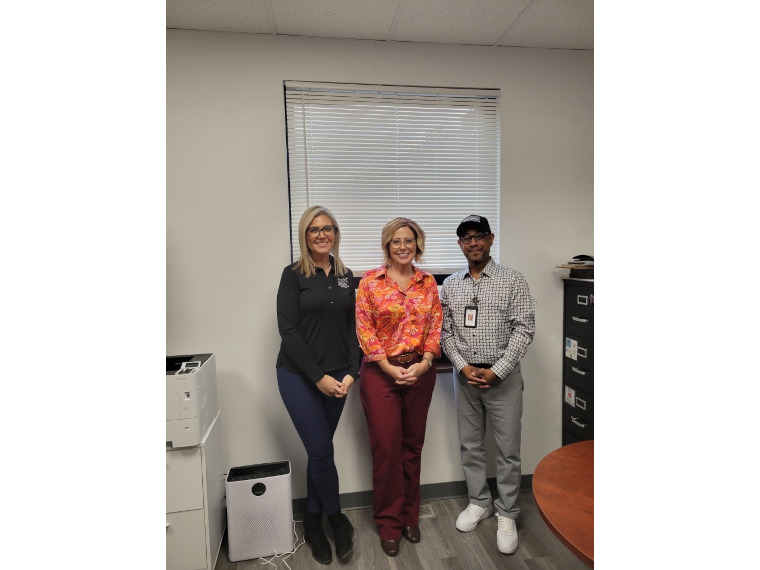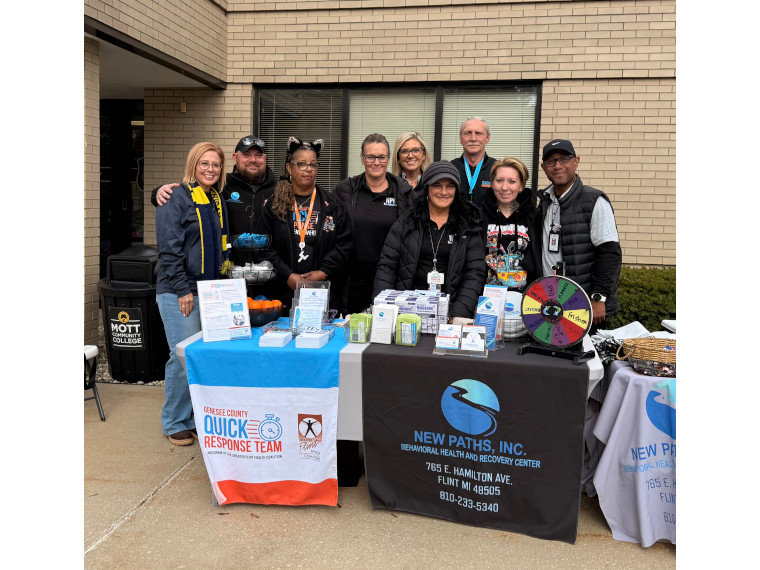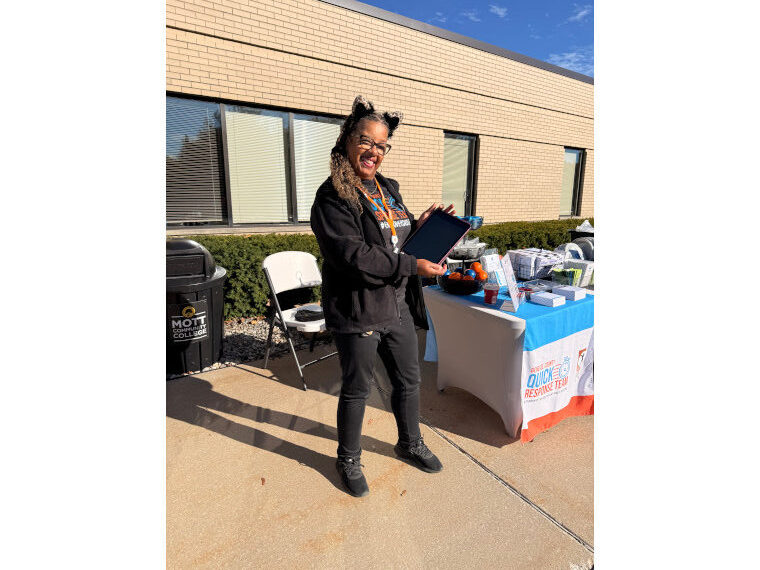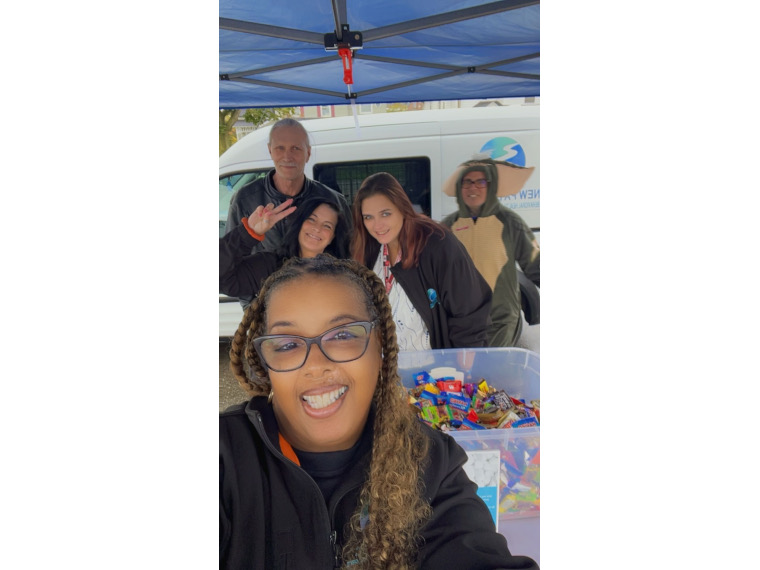Written by Tanya Terry, with photos courtesy of New Paths, Inc.
Featured photo: The Genesee County Quick Response Team was there to assist community residents at a truck or treat event, held in Flint.
Like many individuals in our community and throughout the nation, Darren Munerlyn told the Courier he started using opioids recreationally, as part of “trying to have fun.” Years later, he said he felt he needed alcohol and drugs in order to survive.
“It led me to a life of a lot of broken relationships, incarceration, homelessness, never could keep a job…”he shared.
Munerlyn said for many years he rejected the support others reached out to him with, opting to deal with his problems on his own, which could have led to overdose or even his eventual death.
“I was homeless, sleeping behind a dumpster and had to get up in the morning, begging to get a beer, just to try to survive day to day,” he continued. “I think that was the lowest part of my life.”
Munerlyn went into a treatment center in 2009.
His wife, pastor and others continued to believe in Munerlyn and his ability to again become a valuable member of society
Munerlyn now is able to “give back” to the community because others stood by him during the most difficult times of his life. He serves as a peer recovery coach for Genesee County Quick Response Team at New Paths, one of many teams that is working towards a continued decline in opioid overdose statewide.
The CDC Vital Signs Report (July 2022), using data from the State Unintentional Drug Overdose Reporting System (SUDORS), found that from 2019 to 2020, overdose death rates had increased by 44% among non-Hispanic Black people.
The good news is, in Michigan there was 5.7% decrease in opioid overdose related deaths from 2022 to 2023, a decline rate nearly five times faster than the national average, according to the Michigan Department of Health and Human Services (MDHHS) and the Michigan Attorney General’s office.
A major part of that decline is believed by experts to be the increased accessibility of naloxone.
At one time, naloxone (which NARCAN® is a brand name of ) was utilized only by EMS, in response to an overdose, such as used in ambulances or emergency rooms.
The Genesee County Quick Response Team initiative started in response to the opioid crisis.
“So, the Michigan Department of Health and Human Services was able to provide funding to promote the use of naloxone…whether it was by the common person, by medical professionals, by educators, by those who work in treatment prevention and recovery, a parent, a loved one,” said Erin McClelland, chief operating officer for New Paths, Inc.

McClelland added: “We were able to do that through education and by being able to access naloxone through a portal that is free. We’re able to distribute that amongst the community, wherever that need may be.
“We receive real-time data when overdoses occur in our community, and that’s sets our quick response team up to go to those communities where these overdoses are occurring and make sure we saturate that community with naloxone, and also education on how to utilize the life-saving medication.”

Kelly Ainsworth, senior program director for the Greater Flint Health Coalition (GFHC), added that GFHC and the Genesee County Quick Response Team have been focusing on educating the community on what overdoses look like.
GFHC helps fund and facilitate the Genesee County Quick Response Team, which is staffed predominately with New Paths professionals. The team takes naloxone distribution boxes to various community sites, such as Genesee County hospitals, hotels, motels and rest areas.
Ainsworth said this is especially important because of the rise in fentanyl contamination. She noted a shift from the use of prescribed opioids, to the use of drugs like heroin contaminated into other drugs, without the user necessarily knowing.
The naloxone kits have medication naloxone, designed to work as a competitive antagonist that quickly reverses an opioid overdose. Naloxone binds to opioid receptors in the brain and body and, therefore, blocks other opioids from activating them. It reverses the effects of overdose and restores normal breathing and consciousness temporarily and, hopefully, until the person who has overdosed can receive additional treatment through emergency medical service.
It is virtually harmless if administered to someone and it is not an overdose situation.
There are two doses in the kits, known as harm reduction bags, gloves, a face shield, gauze, alcohol wipes and other items for consumers.
In addition to taking the kits to the drop off locations, the Genesee County Quick Response Team goes to events and resource fairs. The team was most recently at a MiCareer career exploration event, held at the Dort Financial Center, where team members were able to put kits in community members hands directly.
“We meet that individual where they are along their journey of recovery and make sure their needs are met in various ways,” McClelland said.
She added that this could include accessing other community resources such as food pantries, clothing closets, healthcare or childcare.

Munerlyn, who said he has not actively used drugs in eight years, pointed out that the ultimate goal of the kits is to save lives.
Ainsworth said GFHC and the Genesee County Quick Response Team work to reduce the stigma sometimes associated with opioid addiction.
They work instead to ensure that the communities and the individuals within can be well, in whatever way that means for them in the moment.


